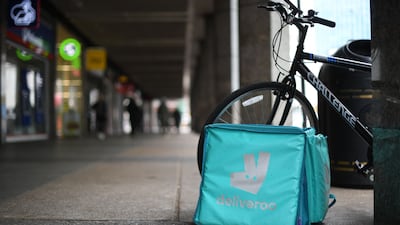Food delivery company Deliveroo rode deeper into the red in its first year as a publicly listed company on Thursday, posting a £298 million ($390m) pre-tax loss for 2021, compared with a £213m loss in 2020.
The London-based company attributed the losses to marketing and technology investment as it sought to maintain momentum after being boosted by coronavirus pandemic restrictions.
Deliveroo expects an increase of between 15 per cent and 25 per cent in the value of its transactions on its platform in 2022, a slowdown from the 70 per cent registered in 2021 when activity was boosted by lockdowns.
Founder and chief executive Will Shu said he was “proud” of the company’s performance in 2021 after it continued to make good progress in executing its strategy.
“At the same time, this year it is clear that all three sides of our marketplace in Europe will face headwinds due to inflationary pressures, the removal of economic stimulus and the broader geopolitical and economic impacts of the conflict in Ukraine,” Mr Shu said in a statement posted on the London Stock Exchange, where its shares are traded.
“We will continue to monitor developments closely. Our 2022 guidance reflects our caution on these factors but we are confident in our ability to adapt financially to a rapidly changing macroeconomic environment.”
The results come about a year after the company’s disastrous debut on the London Stock Exchange on March 31 when the share price plunged 30 per cent on its first day of trading, wiping more than £2bn from Deliveroo’s £7.59bn valuation.
Its share price was up more than 6 per cent on Thursday at 9.01am London time, as investors responded positively to the rising transaction figures. However, the company’s shares have fallen 44 per cent this year.
Last year's revenue increased by 57 per cent to £1.8 billion, driven by the increase in sales transactions.
‘’Deliveroo is riding deeper into the red, as it shifts gears to try to carry off a bigger slice of the takeaway market,” said Susannah Streeter, senior investment and market analyst at Hargreaves Lansdown.
“All muscles are pumping in terms of sales, with gross transactional value jumping by 71 per cent. It is making a huge effort to pedal into new markets to try to widen its reach of riders across the UK, and that has encouraged investors … Its aggressive growth strategy is expensive and even though revenue have risen by 57 per cent, losses have deepened.”
The group said it benefitted from further strength in its key UK business, where orders increased by 72 per cent.
As a result, the company achieved profitability on an adjusted earnings before interest, taxes, depreciation and amortisation (ebitda) basis in the UK and Ireland, something Mr Shu found “particularly encouraging”.
Deliveroo said that it added about 19,000 more restaurant sites to its UK platform over the year, while it was also boosted by its growing grocery operation, which expanded by more than two thirds to about 6,000 sites.
“We are pleased to have strengthened our proposition for our marketplace in 2021, increasing choice for consumers, offering riders more security in the form of improved insurance and giving our restaurant and grocery partners opportunities to grow their businesses,” Mr Shu said.










